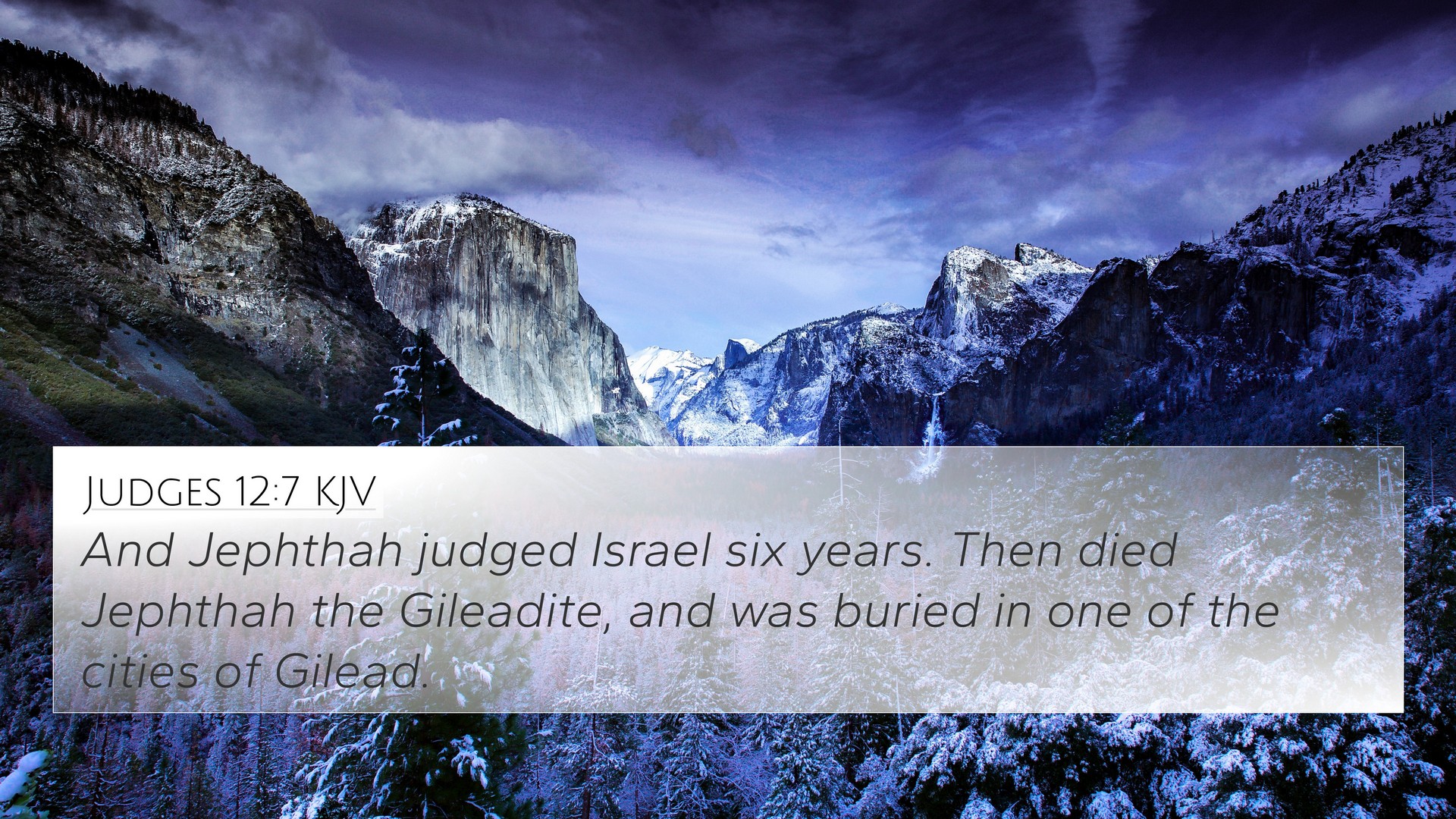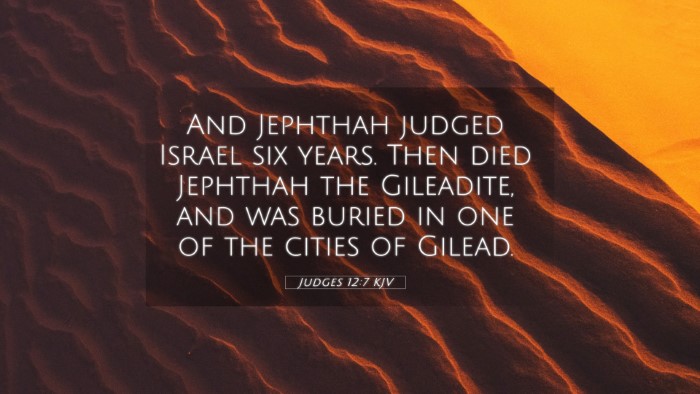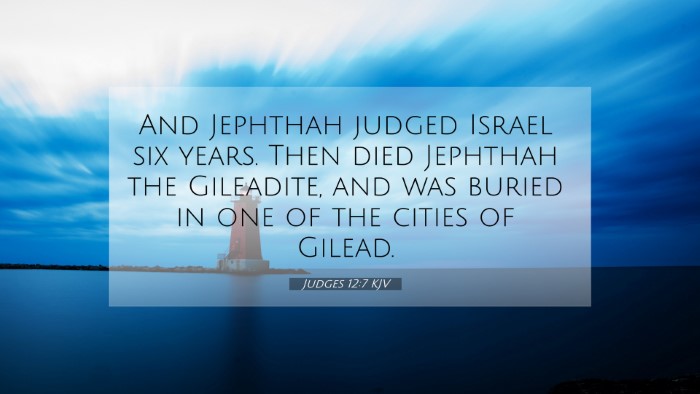Old Testament
Genesis Exodus Leviticus Numbers Deuteronomy Joshua Judges Ruth 1 Samuel 2 Samuel 1 Kings 2 Kings 1 Chronicles 2 Chronicles Ezra Nehemiah Esther Job Psalms Proverbs Ecclesiastes Song of Solomon Isaiah Jeremiah Lamentations Ezekiel Daniel Hosea Joel Amos Obadiah Jonah Micah Nahum Habakkuk Zephaniah Haggai Zechariah MalachiJudges 12:7 Similar Verses
Judges 12:7 Cross References
And Jephthah judged Israel six years. Then died Jephthah the Gileadite, and was buried in one of the cities of Gilead.
Uncover the Rich Themes and Topics of This Bible Verse
Listed below are the Bible themes associated with Judges 12:7. We invite you to explore each theme to gain deeper insights into the Scriptures.
Judges 12:7 Cross Reference Verses
No cross reference images were found in our system for this Bible passage.
Judges 12:7 Verse Analysis and Similar Verses
Understanding Judges 12:7
Judges 12:7 states: “And Jephthah judged Israel six years. Then died Jephthah the Gileadite, and was buried in one of the cities of Gilead.” This verse encapsulates the conclusion of Jephthah's leadership and provides insight into the biblical themes of leadership, death, and legacy.
Verse Context
This verse comes at the end of Jephthah's story and marks a pivotal transitional moment in the Book of Judges. He was known for his conflict with the Ammonites and his controversial vow to God.
Commentary Insights
Matthew Henry’s Commentary
Matthew Henry highlights Jephthah’s tenure as a judge and emphasizes that his leadership was marked by both military success and moral complexity. Henry notes that Jephthah's story serves as a reminder of how leaders can be both flawed and capable, suggesting that God can use imperfect individuals for His purposes.
Albert Barnes’ Commentary
Albert Barnes discusses the brevity of Jephthah's leadership and the importance of his burial in Gilead, a place of significance in his life. Barnes asserts that the burial reflects both the honor accorded to him and the continued remembrance of his legacy among the Gileadites. He notes that the period of judges often ebbs and flows due to the faithfulness or unfaithfulness of leaders.
Adam Clarke’s Commentary
Adam Clarke emphasizes the national implications of Jephthah's judgeship, suggesting that his death represented a moment of transition for Israel. Clarke points out that the duration of his judgeship (six years) reflects a relatively brief period of stability amidst turmoil. He further discusses how the stories of judges provide lessons in faithfulness and leadership.
Cross-References
Judges 12:7 interlinks with several other biblical texts, offering deeper insights into its themes:
- Judges 10:6-18 - Jephthah’s rise to leadership through Israel's oppression.
- Judges 11:1-40 - The account of Jephthah’s vow and his battle against the Ammonites.
- 1 Samuel 12:11 - Reflection on the judges of Israel and their role, reinforcing the transition to monarchy.
- Hebrews 11:32-34 - Mentions Jephthah's faithfulness among other judges, illustrating his place in the faith heroes.
- Judges 16:31 - Referring to another judge, Samson, highlighting the cyclical nature of Israel's leadership.
- Judges 2:16-19 - Themes of God's deliverance through judges which resonate with Jephthah's narrative.
- Isaiah 6:13 - The concept of remnant signifies continuity of God’s plans despite human failings, analogous to Jephthah’s legacy.
Thematic Connections
Judges 12:7 touches on various themes in Scripture, including:
- Leadership and Imperfection: Emphasizing that God can work through imperfect leaders.
- Legacy: Reflecting on how leaders are remembered, both for their actions and their moral choices.
- Divine Providence: Illustrating that God uses circumstances to bring about His will through flawed individuals.
- Covenant and Faithfulness: The relationship between Israel and God as seen through the actions of its judges.
Conclusion
Judges 12:7 serves as an essential reflection point in understanding the dynamics of Israel’s leadership during the judgeship era. Through Jephthah’s life and leadership, we see God’s overarching narrative of choice, failure, and redemption. The cross-referencing of related Bible verses allows for deeper theological insights and developments, enhancing our understanding of Judges as a pivotal historical book.
Tools for Study
For those engaging in cross-referencing Bible study, consider utilizing:
- Bible Concordance: To identify scripture connections efficiently.
- Cross-Reference Bible Study Guides: Which provide tools for exploration and deeper understanding.
- Bible Chain References: To see thematic patterns across scripture easily.
Further Reflection
In your personal study, explore the following:
- What verses are related to Judges 12:7?
- Analyze the connections between Jephthah’s leadership and those of other judges.
- Look into broader scriptural themes of redemption and leadership within the context of Israel’s history.
As you ponder these matters, remember: the Bible is a complex tapestry of interconnected stories, where themes and characters often resonate with one another, illuminating the rich teachings of faith and community.


